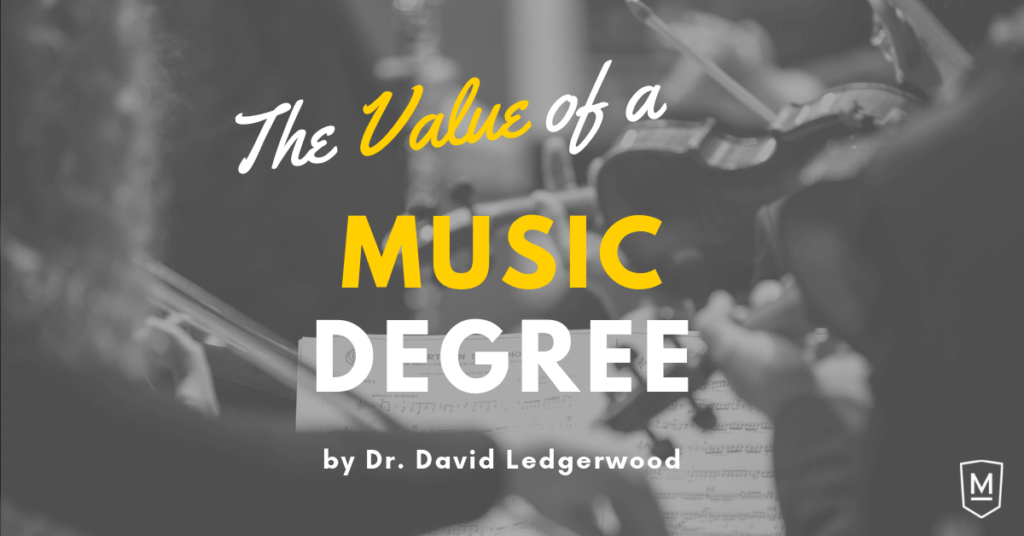The Value of a Music Degree
The following is an article Dr. David Ledgerwood recently wrote as an apologetic for the many benefits gained in obtaining a degree in music.
Parents occasionally question the value of a music degree for their children. As the music department chair and father of four music major graduates, I wanted to contribute a few thoughts in answer to this question.
Musical Skill: A Well-Rounded Craft
To some, musical skill is viewed not as a craft developed over time under the careful guidance of mentors, but as a “talent bomb” dropped from heaven. While musicians would generally grant the importance of talent and inspiration, they would also strongly affirm that no matter the natural gifts, musical skill must be carefully and thoroughly learned over time. The question is, “How best to accomplish this?”
Historically, learning an instrument has been tutorial in nature. The common model has been a single student with a single teacher. This continues to be the overwhelming pattern of choice, even though tutorial education is, by its very nature, expensive. Universities hire recognized and well-credentialed faculty to maintain this high degree of instrumental training. Students often trace their teacher’s pedigree back to important musicians of the past and students vie for positions with recognized teachers.
Important musicians of the past realized that the study of an instrument or voice alone was incomplete. There also needed to be instruction in music history, theory, sight singing, conducting, aesthetics and composition. To bring all of this together, music conservatories, academies, and schools of music where founded and the curriculum somewhat standardized. A student would receive individual instruction on an instrument or voice, and then attend classes where the academic aspects of music were taught. The underlying philosophy was that the complete package (tutorial and classroom instruction) produced the best musicians.
Being well-rounded extends further than just music. Knowledge of theology, historical events, literary analysis methods, mathematical principles, and foreign languages all serve to inform our musical abilities. All of these are part of a liberal arts degree, and historically have been deemed vital for developing the whole person.
The students in these schools would graduate and receive a diploma or degree in music. This credential indicated that the student had successfully fulfilled all of the requirements thought to be necessary to be a competent musician, and thus could be considered for employment. This credential was, and in many ways still is, the gateway for employment.
Musical Credentials: Opening the Door
While credentials are only a part of a resume, examples abound of people without credentials who perform better than those with credentials. My own father never completed his Bachelor’s degree, although it was not because he did not try. He went to night school for years, but when his job transferred him, he lost credits to the point that it was not worth it. He had to support his five children. He purchased an automotive business that prospered despite his lack of a degree. Still, before buying his business, he spent many months out of work, looking for a job. His lack of a degree kept him from even getting an interview. Though he understood accounting and was extremely meticulous, potential employers were not interested in even talking to him without the piece of paper.
Musical Credentials: Transforming the Individual
Credentials are recognized. That fact is indisputable. While credentials do not necessarily make one a better Christian, I have seen God use the rigor expended in the gaining of the credential to instill character and life-skills. I have observed students face character flaws and fix them, not all at once, but over time. In many cases, students are different people (in a good sense) when they complete their academic work, recital, and degree program. They genuinely earn their degree through lots of “gut-busting” work. Because the Lord commands us to be life-long learners in whatever vocation He chooses, and the scripture does say that the “honor of kings is to search out a matter,” the journey to the completion of the degree can bring about much good in a student’s life.
Musical Credentials: Transferrable
Many students will take this degree and lead successful careers as teachers, conductors, or pastors, but a music degree can also prepare and individual for other fields. Several of our music graduates have pursued other fields since graduation, but their musical credentials have served as stepping stones in their career paths. Two of our music graduates are currently practicing or studying to be medical doctors, another works in fraud mitigation for the Best Buy corporation, another is a high school English teacher, another a SCI investigator working for the FBI, and another, while teaching music, designs websites and runs an insurance office. The skills and dispositions learned and the credential earned enabled each of them to be attractive to potential employers. In fact, in one job interview, when asked “Why should we hire a music graduate?” the music student demonstrated that the skills needed in learning to break down a difficult piece of piano music were the same ones needed for leading a project management team.
Conclusion
I have been teaching music in higher education for 33 years. My institution is a Christian one, and thus seeks to present knowledge holistically, attempting to touch each person’s mind and heart. I realize that knowledge without wisdom and understanding can lead to pride and godless self-sufficiency. This is obviously not our desire. At the same time, the discipline, character and God-dependence learned by obtaining a credentialed program degree can guide a person to a lifetime of growth and fulfillment.
by Dr. David Ledgerwood


